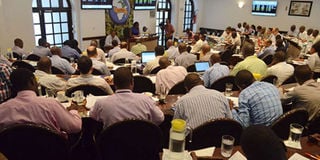New tea auction rules are bad for local sector

Stakeholders in the tea sector meet at Tea Trade Centre in Mombasa on July 25, 2017. PHOTO | FILE | NATION MEDIA GROUP
What you need to know:
- Anybody is free to join in and compete fairly but without the government arm-twisting the existing brokers.
- Most endangered are teas from regional countries. We wrestled the tea auction from London against stiff competition from Dubai and Egypt.
The new auction market regulations for the tea sector in Kenya disturb me as the person who was in charge of reforms in the sector in the 1990s and also as a small-scale tea farmer.
In perspective, my attention has been drawn to the regulations for the Mombasa Tea Auction recently issued by Agriculture Cabinet Secretary Peter Munya.
Kenya is the number one exporter of tea, itself the highest foreign exchange earner for the country, bringing in well over $1 billion annually. It employs, directly and indirectly, more than five million Kenyans.
The CS has banned sale by private treaty, commonly known as direct sales, contrary to the Competition Authority of Kenya Act 2010.
If tea must now be exclusively sold through the auction, the risk of oversupply and underpricing is real due to the inevitable glut. This monopolistic auction cannot assure one of a return on investment. The likelihood of looking elsewhere is real.
Most endangered are teas from regional countries. We wrestled the tea auction from London against stiff competition from Dubai and Egypt.
Then the regional tea community from as far away as Mozambique joined us as a market of choice.
DESERTION
The entire Great Lakes region uses this market too. Private treaties have given it the stability it has enjoyed this far by making it competitive.
Returning it to inefficient old monopolistic practices can only generate the kind of inefficiencies that we stemmed. Prepare to see mass desertions by regional countries.
When I became Minister for Agriculture in December 1997, I found the tea sector exceptionally explosive.
Strikes by farmers were the order of the day, especially in the Mt Kenya region. Farmers were not happy with the marketing of their produce by the Kenya Tea Development Authority (KTDA).
They wanted participation in this, as well as in the management of tea factories.
In consultation with their representatives — such as Mr John Michuki and Mr George Anyona —we drafted a Bill that converted the authority into an agency.
Farmers could elect representatives to KTDA and the boards of factories. The agency has since been less intrusive into their activities and they get good returns for their tea and payment is on time.
VALUE ADDITION
In 1999, I signed Legal Notice No. 44 that secured these changes. We liberalised the sector from the firm grip of the government.
The strikes and demonstrations ended. We had made an in-depth study of the entire tea value chain .
We understood the role of the managing entity (the old KTDA), the Kenya Tea Growers Association and the tea auction.
The study also covered value addition and promotion of our tea overseas. The role and functions of the government, through the Agriculture ministry, the industry regulator (the then-Tea Board of Kenya) as well as tea research (the then-Tea Research Foundation) were exhaustively covered.
To ensure independence and objectivity, the government engaged our development partners for their skills and expertise.
This study culminated in Sessional Paper No. 2 of 1999, which provided a comprehensive roadmap for reforms in the tea industry.
After 1999, the Tea Sector was governed by the repealed Tea Act Cap 343. It is now governed by the Crops Act No. 13 of 2013.
Regulations under the former law were issued in 2000 but later struck out by the High Court for “inconsistency with the written law”.
BROKERS
The new Regulations, of 2008, lasted until 2015, when they lapsed under the current law — hence, the new set of regulations.
But regulations should be progressively ameliorative. They should not be a throwback to bad practices.
A registered tea broker will now represent a maximum of 15 factories or limited companies, a rule they shall adopt when renewing their registration. But in a free market, tea producers should be left to recruit their brokers.
Such restrictions as are being imposed do not exist in comparable countries, such as India and Sri Lanka.
It appears the only motivation for this provision is to disable existing brokers to make room for new parties. Anybody is free to join in and compete fairly but without the government arm-twisting the existing brokers.
Mr Mudavadi, the ANC party leader, is a former Vice-President, Cabinet minister for Agriculture and also Finance.




